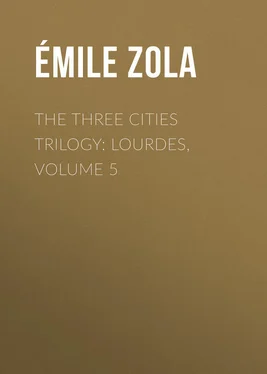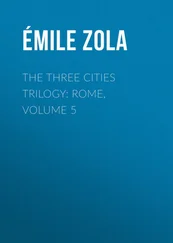Émile Zola - The Three Cities Trilogy - Lourdes, Volume 5
Здесь есть возможность читать онлайн «Émile Zola - The Three Cities Trilogy - Lourdes, Volume 5» — ознакомительный отрывок электронной книги совершенно бесплатно, а после прочтения отрывка купить полную версию. В некоторых случаях можно слушать аудио, скачать через торрент в формате fb2 и присутствует краткое содержание. Жанр: literature_19, foreign_antique, foreign_prose, на английском языке. Описание произведения, (предисловие) а так же отзывы посетителей доступны на портале библиотеки ЛибКат.
- Название:The Three Cities Trilogy: Lourdes, Volume 5
- Автор:
- Жанр:
- Год:неизвестен
- ISBN:нет данных
- Рейтинг книги:4 / 5. Голосов: 1
-
Избранное:Добавить в избранное
- Отзывы:
-
Ваша оценка:
- 80
- 1
- 2
- 3
- 4
- 5
The Three Cities Trilogy: Lourdes, Volume 5: краткое содержание, описание и аннотация
Предлагаем к чтению аннотацию, описание, краткое содержание или предисловие (зависит от того, что написал сам автор книги «The Three Cities Trilogy: Lourdes, Volume 5»). Если вы не нашли необходимую информацию о книге — напишите в комментариях, мы постараемся отыскать её.
The Three Cities Trilogy: Lourdes, Volume 5 — читать онлайн ознакомительный отрывок
Ниже представлен текст книги, разбитый по страницам. Система сохранения места последней прочитанной страницы, позволяет с удобством читать онлайн бесплатно книгу «The Three Cities Trilogy: Lourdes, Volume 5», без необходимости каждый раз заново искать на чём Вы остановились. Поставьте закладку, и сможете в любой момент перейти на страницу, на которой закончили чтение.
Интервал:
Закладка:
Then, turning towards the priest, he added "Monsieur l'Abbe, it was her excessive piety which certainly hastened her end. Yesterday, at the Grotto, she had a bad attack, which was a warning. And in spite of her fatigue she obstinately followed the procession afterwards. I thought then that she could not last long. Yet, out of delicacy, one did not like to say anything to her, for fear of frightening her."
Pierre gently knelt down and said the customary prayers, with that human emotion which was his nearest approach to faith in the presence of eternal life and eternal death, both so pitiful. Then, as he remained kneeling a little longer, he overheard snatches of the conversation around him.
Little Gustave, forgotten on his couch amid the disorder of the other room, must have lost patience, for he had begun to cry and call out, "Mamma! mamma! mamma!"
At length Madame Vigneron went to quiet him, and it occurred to her to carry him in her arms to kiss his poor aunt for the last time. But at first he struggled and refused, crying so much that M. Vigneron was obliged to interfere and try to make him ashamed of himself. What! he who was never frightened of anything! who bore suffering with the courage of a grown-up man! And to think it was a question of kissing his poor aunt, who had always been so kind, whose last thought must most certainly have been for him!
"Give him to me," said he to his wife; "he's going to be good."
Gustave ended by clinging to his father's neck. He came shivering in his night-shirt, displaying his wretched little body devoured by scrofula. It seemed indeed as though the miraculous water of the piscinas, far from curing him, had freshened the sore on his back; whilst his scraggy leg hung down inertly like a dry stick.
"Kiss her," resumed M. Vigneron.
The child leant forward and kissed his aunt on the forehead. It was not death which upset him and caused him to struggle. Since he had been in the room he had been looking at the dead woman with an air of quiet curiosity. He did not love her, he had suffered on her account so long. He had the ideas and feelings of a man, and the weight of them was stifling him as, like his complaint, they developed and became more acute. He felt full well that he was too little, that children ought not to understand what only concerns their elders.
However, his father, seating himself out of the way, kept him on his knee, whilst his mother closed the window and lit the two candles on the mantelpiece. "Ah! my poor dear," murmured M. Vigneron, feeling that he must say something, "it's a cruel loss for all of us. Our trip is now completely spoilt; this is our last day, for we start this afternoon. And the Blessed Virgin, too, was showing herself so kind to us."
However, seeing his son's surprised look, a look of infinite sadness and reproach, he hastened to add: "Yes, of course, I know that she hasn't yet quite cured you. But we must not despair of her kindness. She loves us so well, she shows us so many favours that she will certainly end by curing you, since that is now the only favour that remains for her to grant us."
Madame Vigneron, who was listening, drew near and said: "How happy we should have been to have returned to Paris all three hale and hearty! Nothing is ever perfect!"
"I say!" suddenly observed Monsieur Vigneron, "I sha'n't be able to leave with you this afternoon, on account of the formalities which have to be gone through. I hope that my return ticket will still be available to-morrow!"
They were both getting over the frightful shock, feeling a sense of relief in spite of their affection for Madame Chaise; and, in fact, they were already forgetting her, anxious above all things to leave Lourdes as soon as possible, as though the principal object of their journey had been attained. A decorous, unavowed delight was slowly penetrating them.
"When I get back to Paris there will be so much for me to do," continued M. Vigneron. "I, who now only long for repose! All the same I shall remain my three years at the Ministry, until I can retire, especially now that I am certain of the retiring pension of chief clerk. But afterwards – oh! afterwards I certainly hope to enjoy life a bit. Since this money has come to us I shall purchase the estate of Les Billottes, that superb property down at my native place which I have always been dreaming of. And I promise you that I sha'n't find time hanging heavy on my hands in the midst of my horses, my dogs, and my flowers!"
Little Gustave was still on his father's knee, his night-shirt tucked up, his whole wretched misshapen body shivering, and displaying the scragginess of a slowly dying child. When he perceived that his father, now full of his dream of an opulent life, no longer seemed to notice that he was there, he gave one of his enigmatical smiles, in which melancholy was tinged with malice. "But what about me, father?" he asked.
M. Vigneron started, like one aroused from sleep, and did not at first seem to understand. "You, little one? You'll be with us, of course!"
But Gustave gave him a long, straight look, without ceasing to smile with his artful, though woeful lips. "Oh! do you think so?" he asked.
"Of course I think so! You'll be with us, and it will be very nice to be with us."
Uneasy, stammering, unable to find the proper words, M. Vigneron felt a chill come over him when his son shrugged his skinny shoulders with an air of philosophical disdain and answered: "Oh, no! I shall be dead."
And then the terrified father was suddenly able to detect in the child's deep glance the glance of a man who was very aged, very knowing in all things, acquainted with all the abominations of life through having gone through them. What especially alarmed him was the abrupt conviction that this child had always seen into the innermost recesses of his heart, even farther than the things he dared to acknowledge to himself. He could recall that when the little sufferer had been but a baby in his cradle his eyes would frequently be fixed upon his own – and even then those eyes had been rendered so sharp by suffering, endowed, too, with such an extraordinary power of divination, that they had seemed able to dive into the unconscious thoughts buried in the depths of his brain. And by a singular counter-effect all the things that he had never owned to himself he now found in his child's eyes – he beheld them, read them there, against his will. The story of his cupidity lay unfolded before him, his anger at having such a sorry son, his anguish at the idea that Madame Chaise's fortune depended upon such a fragile existence, his eager desire that she might make haste and die whilst the youngster was still there, in order that he might finger the legacy. It was simply a question of days, this duel as to which should go off first. And then, at the end, it still meant death – the youngster must in his turn disappear, whilst he, the father, alone pocketed the cash, and lived joyfully to a good old age. And these frightful things shone forth so clearly from the keen, melancholy, smiling eyes of the poor condemned child, passed from son to father with such evident distinctness, that for a moment it seemed to them that they were shouting them aloud.
However, M. Vigneron struggled against it all, and, averting his head, began energetically protesting: "How! You'll be dead? What an idea! It's absurd to have such ideas as that!"
Meantime, Madame Vigneron was sobbing. "You wicked child," she gasped; "how can you make us so unhappy, when we already have such a cruel loss to deplore?"
Gustave had to kiss them, and to promise them that he would live for their sakes. Yet he did not cease smiling, conscious as he was that a lie is necessary when one does not wish to be too miserable, and quite prepared, moreover, to leave his parents happy behind him, since even the Blessed Virgin herself was powerless to grant him in this world the little happy lot to which each creature should be born.
Читать дальшеИнтервал:
Закладка:
Похожие книги на «The Three Cities Trilogy: Lourdes, Volume 5»
Представляем Вашему вниманию похожие книги на «The Three Cities Trilogy: Lourdes, Volume 5» списком для выбора. Мы отобрали схожую по названию и смыслу литературу в надежде предоставить читателям больше вариантов отыскать новые, интересные, ещё непрочитанные произведения.
Обсуждение, отзывы о книге «The Three Cities Trilogy: Lourdes, Volume 5» и просто собственные мнения читателей. Оставьте ваши комментарии, напишите, что Вы думаете о произведении, его смысле или главных героях. Укажите что конкретно понравилось, а что нет, и почему Вы так считаете.












